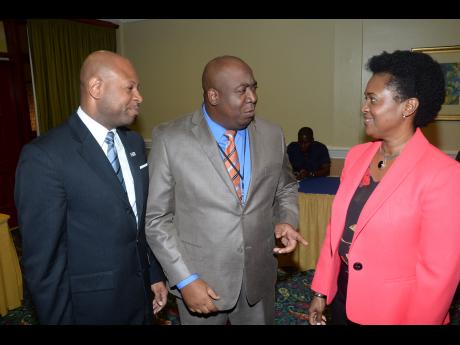Cops urged to plan for retirement
Licenced pension adviser Sharon Smith, a senior manager at JN Bank, has urged more members of the police force to ensure that they are adequately prepared for their retirement.
Speaking to a group of police personnel from the Jamaica Constabulary Force's (JCF) Non-Geographic Formations Branch 02 at a seminar sponsored by JN Bank last week, Smith stressed that retirement could be sudden.
"Retirement is not always based on age. It can come at any time in your life because retirement is that time of your of life when you can no longer earn an income," the JN Individual Retirement Scheme (JNRS) pension adviser underscored.
"You have an occupation, which is rife with hazards, and, therefore, you could have an accident or you could be injured tomorrow morning, and you can't work anymore, hence, at that time, you would need to retire," Smith explained.
That is exactly what happened to retired corporal Astley Smith.
The 67-year-old St Thomas native was hit from his police motorbike by a patrol car while on duty in the parish in 1979.
He suffered multiple injuries to his foot, broke the bones in his right wrist, and totally lost use of his right hand. He also damaged his right eye, from which he lost vision and injured the nerves in his left hand and shoulder as well as other parts of his body.
He subsequently returned to the JCF after being hospitalised for six months and eventually retired a few years later as a result of the debilitating injuries he received.
The retired policeman receives a pension of $71,000 per month in public sector and National Insurance Scheme (NIS) pension benefits. He also gets disability payments of $315 per month from the Government for his injuries; and his disability compensation is based on his salary at the time of the accident, which was approximately $5,000 per annum in 1979.
MOUNTING LIVING EXPENSES
Apart from the severe physical pain and suffering, which he endures daily, he says that his mounting living expenses have made life unbearable.
"It gets harder and harder for me every day. I have no savings, and the little that I receive from my pension cannot meet my costs. I live alone and without help from family members. I live at the mercy and kindness of strangers," the divorcÈ and father of three adult children lamented.
Some police and Jamaicans in similar fields have faced plights comparable to the retired corporal's, Assistant Chaplain of the JCF Rev Courtney Faulknor underscores. Life after retirement is, for some, a constant struggle, although he says it is not the norm for most. He notes that those who struggle are often those who failed to plan for retirement by making solid investments.
Smith highlights that the monthly income provided by the Government, and through the NIS, is sometimes not enough to assist a retiree to make ends meet.
"Mortgage or rental payments, food and utilities, as well as healthcare costs, are just a few of the mounting living expenses that officers are burdened with," she related.
She advised that engaging in prudent money-management practices throughout one's working life is, therefore, important to preparing for retirement.
"Proper money-management practices are an essential part of planning for retirement," she advised.
"You need to ensure that you are managing the money you earn in the best possible way. And you must understand that your pension savings alone will never be enough for a comfortable retirement unless you started with your first paycheque in your early 20s, which most of us did not do."
She stresses the need to budget carefully and to ensure that one plans for retirement effectively.
GOOD APPROACH
Supporting her, Rose Miller, grants manager at the JN Foundation and financial literacy adviser, says that adopting the 10-10-80 rule is a good approach to budgeting one's income. The rule means that one saves 10 per cent of one's income; gives away 10 per cent to a person in need, or to a charitable cause; and uses the remaining 80 per cent to cover expenses.
However, Miller advises that saving alone will not generate the wealth most people want to achieve, but it is a starting point, which leads to investment to gain higher returns.
She also encourages people to use their professional skills to earn extra income, where possible, and to invest in real estate; appropriate insurance products, as well as one's financial education.
"It's education and information about money management that will help you to identify opportunities and prepare yourself to take advantage of them," she stated.

